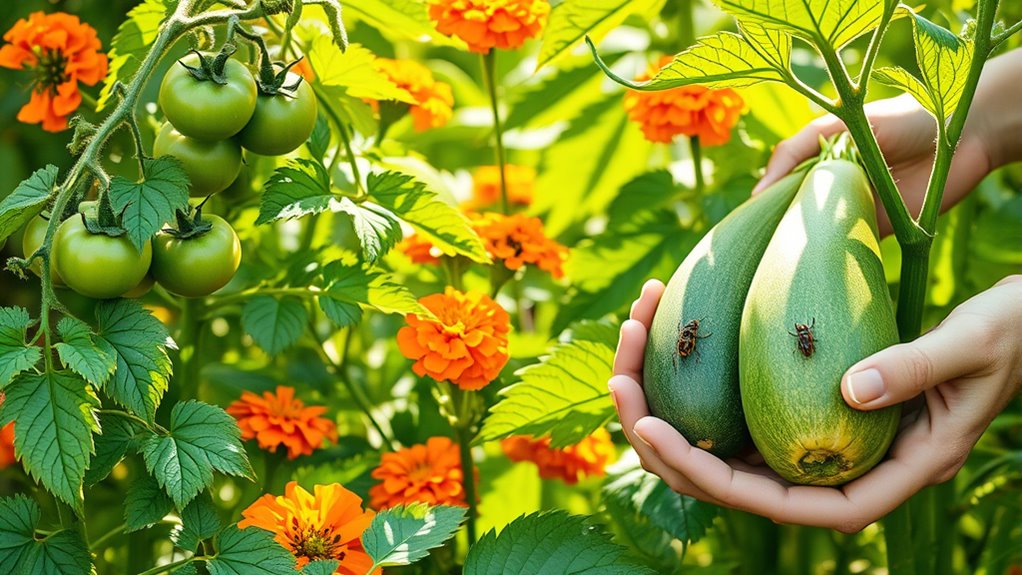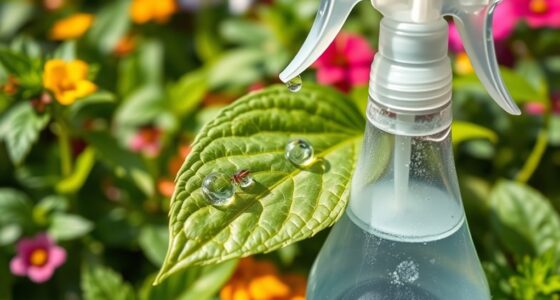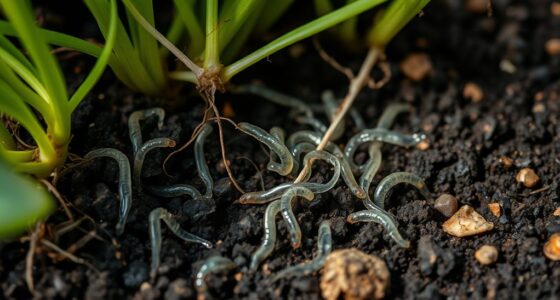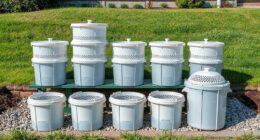To effectively control pests organically, start by attracting beneficial insects like ladybugs and lacewings, which naturally prey on pests. Use natural repellents such as neem oil or garlic spray, and apply them consistently to deter insects without harming your plants. Incorporate companion planting to attract helpful bugs and reduce pests. Combining these methods, along with maintaining garden health, creates a balanced ecosystem that keeps pests in check. Discover more ways to protect your garden naturally as you explore further.
Key Takeaways
- Release beneficial insects like ladybugs and lacewings early to naturally reduce pest populations.
- Use homemade natural repellents such as garlic and chili sprays to deter pests effectively.
- Implement companion planting with plants that attract beneficial insects and repel pests.
- Apply organic treatments like neem oil weekly to prevent and manage pest issues proactively.
- Maintain a biodiverse, chemical-free garden environment to promote natural pest control and overall plant health.
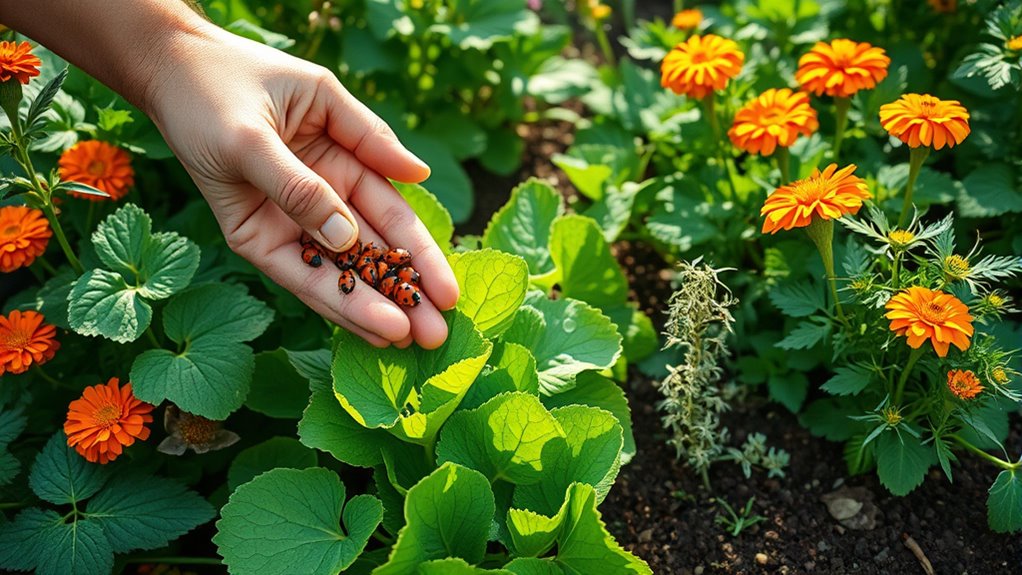
Are you looking for effective ways to protect your garden without relying on chemicals? If so, harnessing the power of beneficial insects and natural repellents can make a real difference. Beneficial insects, like ladybugs, lacewings, and predatory beetles, naturally target common pests such as aphids, mites, and caterpillars. By attracting or releasing these helpful bugs into your garden, you create a natural defense system that keeps pest populations in check without harmful chemicals. To do this effectively, plant a variety of nectar-rich flowers, such as daisies or fennel, which attract beneficial insects and provide them with food sources. Avoid broad-spectrum insecticides, as they can harm these beneficial allies and upset the natural balance you’re trying to establish.
Enhance your garden’s health by attracting beneficial insects with nectar-rich plants and avoiding harmful broad-spectrum insecticides.
Natural repellents are another cornerstone of organic pest control. These are substances derived from plants or other natural sources that deter pests without risking your garden’s health or the environment. For example, neem oil, garlic spray, and chili pepper solutions are popular choices. You can make a simple garlic or chili spray at home by blending ingredients with water, then straining and spraying it onto your plants. These repellents work by creating an unpleasant scent or taste that pests avoid, giving your plants a layer of protection. When applying natural repellents, be consistent and target the undersides of leaves and areas where pests tend to congregate. This not only improves efficacy but also ensures pests are deterred before they cause significant damage. Incorporating Cheesy Polenta as a companion plant can also help deter certain pests by attracting beneficial insects that prey on crop pests.
Another effective approach involves integrating beneficial insects and natural repellents into a holistic pest management plan. For instance, releasing ladybugs in early spring can reduce aphid populations, while applying neem oil weekly can prevent multiple pest issues. Remember, the key lies in early intervention and maintaining a healthy, balanced garden ecosystem. Avoid overusing repellents or releasing beneficial insects in overwhelming numbers; instead, aim for a natural equilibrium where pests are kept under control naturally.
Ultimately, the combination of encouraging beneficial insects and applying natural repellents offers a sustainable, eco-friendly way to protect your garden. These methods promote biodiversity, reduce chemical runoff, and support the overall health of your plants. With patience and consistency, you’ll cultivate a thriving garden that resists pests in a way that’s safe for your family, pollinators, and the planet. Organic pest control isn’t just about eliminating pests—it’s about fostering a balanced environment where your garden can flourish naturally.
Frequently Asked Questions
Are Organic Pest Control Methods Safe for Pets?
You’re wondering if organic pest control methods are safe for pets. While these methods often have fewer chemical concerns, pet safety still matters. Many organic options, like neem oil or insecticidal soap, are generally safe when used correctly, but over-application or accidental ingestion can pose risks. Always follow product instructions and keep pets away during treatment. Organic doesn’t mean completely risk-free, so stay cautious to protect your furry friends.
How Long Do Organic Pest Control Treatments Typically Last?
You’re wondering about the duration effectiveness of organic pest control treatments. Typically, their treatment longevity ranges from a few days up to several weeks, depending on the method used and pest type. Natural solutions like neem oil or diatomaceous earth often need reapplication every couple of weeks for sustained control. Keep monitoring pests and reapply as needed to maintain effective protection, ensuring your organic approach remains successful over time.
Can Organic Methods Eliminate All Types of Pests?
Think of organic pest control as a gentle rain nurturing your garden—effective, but not a storm that wipes out everything. You might wish it could banish all pests, but it doesn’t always conquer stubborn invaders like synthetic pesticides do. Organic methods work best alongside good practices, reducing chemical residues and avoiding harmful side effects. While they’re powerful allies, they may not eliminate every pest, especially tougher ones.
Do Organic Pest Controls Affect Plant Growth?
You might wonder if organic pest controls affect plant growth. Generally, they support plant health by reducing harmful pests without the harsh chemicals that can stunt growth. Organic methods often promote pest resistance in plants, making them stronger over time. When used properly, these controls help maintain ideal plant development, ensuring healthy growth while effectively managing pests. Overall, organic pest control methods tend to benefit plants without hindering their growth.
Are Organic Pest Control Methods Cost-Effective Long-Term?
Think of organic pest control as planting seeds of sustainability. It’s often cost-effective long-term, offering economic benefits by reducing reliance on pricey chemicals. Plus, it minimizes environmental impact, like a gentle breeze preserving nature’s balance. While initial costs might seem higher, you save money over time through healthier plants and fewer treatments. Embracing these methods helps you nurture a thriving garden that benefits both your wallet and the planet.
Conclusion
Now that you’ve discovered these proven organic pest control methods, imagine how your garden could thrive without harmful chemicals. But here’s the twist—there’s one surprisingly simple trick that might just be the game-changer you’ve been missing. Are you ready to try it and see the results for yourself? Your plants—and your peace of mind—are about to get a whole lot better. Stay tuned, because the best is yet to come.
